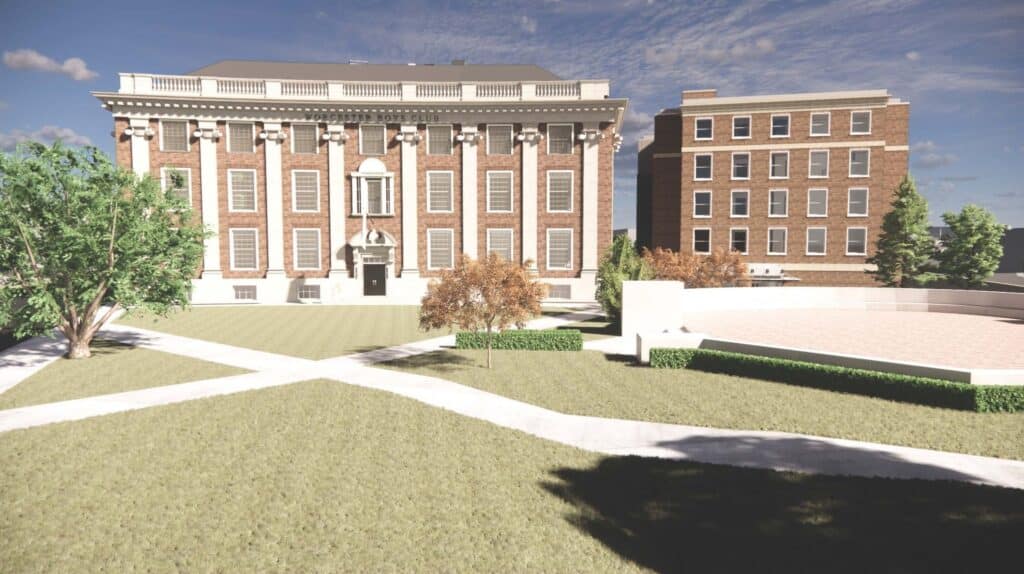Focus of MA Building Changing from Youth to Seniors

By Mark Fogarty
6 min read
A building dedicated to helping boys in Worcester, MA, for decades, is undergoing an adaptive reuse that will turn it into affordable housing for seniors.
WinnDevelopment has begun construction on the Residences on Lincoln Square, a project to turn the nearly-century-old Worcester Boys Club and an adjacent vacant property into 80 units of affordable housing for seniors. Eleven of those units have been set aside for people with disabilities and will be fully accessible.

Andrew Colbert, vice president, notes the “great success” WinnDevelopment has had recently in redeveloping another adaptive reuse, Mill Street Square in Paterson, NJ.
Colbert says the Boys Club property and an adjacent vocational high school have been on Winn’s radar since the early 2010s. The property was owned by the city, which was looking for a “spark” for the Gateway Park area.
Winn acquired the vocational high school from the Worcester Business Development Corp., transforming the historic building into Voke Lofts, which has 84 units of mixed-income housing.
But the Boys Club, vacant since 2006, remained as “the missing tooth” in the area’s redevelopment, Colbert says. Winn remained “focused” on doing a reuse there as well, Colbert adds.
“It is a prominent building with great history, but it has been vacant for close to 20 years,” he says.
“Winn continued to work with the City of Worcester and regional partners to find ways to convert the building into some form of successful economic reuse,” Colbert says.
Winn pursued potential projects for student housing and a medical office building but neither of those uses panned out, so the company purchased the four-story Boys Club building in 2019 to explore an adaptive reuse into affordable housing.
“We were finding that just transforming the historic building into housing was not going to produce enough units to justify the resources required to make that conversion possible,” he says.
The historic and non-residential nature of the existing building resulted in areas of the property being non-conducive to housing, so Winn purchased an adjacent vacant piece of land. The combined square footage of more than 100,000 square feet allowed Winn to achieve the scale necessary for what it is now constructing.
Old and New Buildings
The result is planned to be 16 apartments and a variety of community spaces at the Boys Club while erecting a new five-story apartment building alongside it to house 64 new apartments. The two buildings will be connected on the ground floor by a single-story glass walkway.
The new community will feature a total of 19 studios, 46 one-bedroom units and 15 two-bedroom apartments. Sixty-eight apartments will be leased to households earning up to 60 percent of area median income (AMI) and 12 units will be available to those earning up to 30 percent AMI. Eleven apartments will be set aside as housing for residents with disabilities.
Seventy percent of the units have been set aside for residents of Worcester and there will be a lottery for these units. The lottery should make for faster lease-up and move-in for residents.
Construction began this fall with completion foreseen in the first quarter of 2026.
The National Park Service reviewed both the existing structure and the new building.
Winn applied twice for tax credit funding from the state of Massachusetts and was awarded funds in August of 2023. Closing occurred in August of this year.
The capital stack for the $51 million project also includes Federal Low Income Housing Tax Credits, both four and nine percent, and State and Federal Historic Tax Credits. That’s five different tax credit sources.
The City of Worcester provided Affordable Housing Trust Funds and HOME funds, while the state supported the development from several sources, administered by the Executive Office of Housing and Livable Communities (EOHLC) and MassHousing.
MassDevelopment also made a grant, using its Underutilized Properties Program.
All in all, the project has 13 different financing sources, including a construction loan from Rockland Trust and a first mortgage from Massachusetts Housing Partnership.
The City of Worcester “has seen great growth over the past decade,” and demand for affordable housing “is as high as ever,” Colbert says.
“There’s a waiting list for all of Winn’s properties in Worcester and we expect this community to be no different,” Colbert notes.
City and State Funding
The city “has been a great partner for these projects to get approved and receive local funding,” he says. Those components were critical to receiving the state money.
The property is in a Commercial Corridor Overlay District designed to encourage the preservation and redevelopment of historical, cultural and architectural assets in the city.
Colbert says that all units are designed to adapt to residents’ needs as they age, and all amenity spaces are fully accessible. The unit types of the two buildings “are distinctly different,” Colbert says. The historic building units have their original molding, for instance, tall windows and high ceilings.
Units in the new construction “are exciting in their own right.” It is going to be Passive House-certified, “the most rigorous energy performance standard in the world,” Colbert says.
“The heating and cooling demand on the building is drastically reduced through sustainability and green design,” he says. “We’re thrilled to be delivering that.”
It will be all-electric, with a goal of zero carbon emissions.
F.W. Madigan Company, Inc. of Worcester, is serving as the general contractor with Maugel DeStefano Architects of Harvard, MA, serving as architect. Rounding out the development team are Petersen Engineering, as mechanical, electrical and plumbing engineer; The Public Archaeology Laboratory, Inc. (PAL), as a historic consultant; Vanasse Hangen Brustlin, Inc. (VHB), as the civil engineer; Odeh Engineers, Inc., as structural engineer; and, Building Evolution Corp. (BEC) and Sustainable Comfort Inc. (SCI), as passive house consultants.
The amenity spaces will all be in the historic building. A basement basketball court will be converted into a fitness center. An old classroom will be converted into the resident lounge.
“It’s pretty amazing what these spaces will look like upon completion,” Colbert says.
Another exciting and unusual feature is that the land for the new construction building was a discontinued public street. Additionally, Winn acquired air rights from the City to build over an active roadway that includes an existing tunnel and underpass.
“It’s a city street that bisects the heavily congested Lincoln Square. Our project is built over this underpass and tunnel,” Colbert says. “We acquired air rights from the city of Worcester so that we can span this roadway and construct these units. This is all part of a broader effort to transform Lincoln Square and hide the scars of urban renewal in the late 1950s and early 1960s.”
The road is currently closed to allow construction but upon conclusion will reopen so that vehicular traffic can pass underneath the 64 units of new construction.
Colbert calls this “complex engineering to find solutions and fill a need.” The buildover represents “one of the first of its kind, maybe even across the country.”
